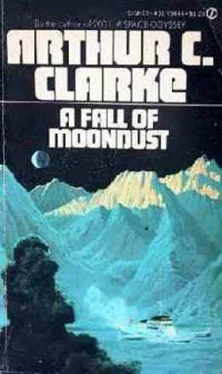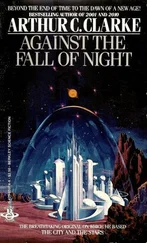Arthur Clarke - A Fall of Moondust
Здесь есть возможность читать онлайн «Arthur Clarke - A Fall of Moondust» весь текст электронной книги совершенно бесплатно (целиком полную версию без сокращений). В некоторых случаях можно слушать аудио, скачать через торрент в формате fb2 и присутствует краткое содержание. Жанр: Фантастика и фэнтези, на английском языке. Описание произведения, (предисловие) а так же отзывы посетителей доступны на портале библиотеки ЛибКат.
- Название:A Fall of Moondust
- Автор:
- Жанр:
- Год:неизвестен
- ISBN:нет данных
- Рейтинг книги:5 / 5. Голосов: 1
-
Избранное:Добавить в избранное
- Отзывы:
-
Ваша оценка:
- 100
- 1
- 2
- 3
- 4
- 5
A Fall of Moondust: краткое содержание, описание и аннотация
Предлагаем к чтению аннотацию, описание, краткое содержание или предисловие (зависит от того, что написал сам автор книги «A Fall of Moondust»). Если вы не нашли необходимую информацию о книге — напишите в комментариях, мы постараемся отыскать её.
A Fall of Moondust — читать онлайн бесплатно полную книгу (весь текст) целиком
Ниже представлен текст книги, разбитый по страницам. Система сохранения места последней прочитанной страницы, позволяет с удобством читать онлайн бесплатно книгу «A Fall of Moondust», без необходимости каждый раз заново искать на чём Вы остановились. Поставьте закладку, и сможете в любой момент перейти на страницу, на которой закончили чтение.
Интервал:
Закладка:
When he had finished dictating, he paused to marshal his ideas, could think of nothing further, and added: “Copies to Chief Administrator, Moon; Chief Engineer, Farside; Supervisor, Traffic Control; Tourist Commissioner; Central Filing. Classify as Confidential.”
He pressed the transcription key. Within twenty seconds all twelve pages of his report, impeccably typed and punctuated, with several grammatical slips corrected, had emerged from the office telefax. He scanned it rapidly, in case the electrosecretary had made mistakes. She did this occasionally (all electrosees were “she”), especially during rush periods when she might be taking dictation from a dozen sources at once. In any event, no wholly sane machine could cope with all the eccentricities of a language like English, and every wise executive checked his final draft before he sent it out. Many were the hilarious disasters that had overtaken those who had left it all to electrónics.
Lawrence was halfway through this task when the telephone rang.
“Lagrange II on the line, sir”, said the operator — a human one, as it happened. “A Doctor Lawson wants to speak to you.”
Lawson? Who the devil's that? the C. E. E. asked himself. Then he remembered; that was the astronomer who was making the telescopic search. Surely someone had told him that it was useless.
The Chief Engineer had never had the dubious privilege of meeting Dr. Lawson. He did not know that the astronomer was a very neurotic and very brilliant young man — and, what was more important in this case, a very stubborn one.
Lawson had just begun to dismantle the infrared scanner when he stopped to consider his action. Since he had practically completed the blasted thing, he might as well test it, out of sheer scientific curiosity. He prided himself, rightly, as a practical experimenter; this was something unusual in an age when most so-called astronomers were really mathematicians who never went near an observatory.
He was now so tired that only sheer cussedness kept him going. If the scanner had not worked the first time, he would have postponed testing it until he had had some sleep. But by the good luck that is occasionally the reward of skill, it did work; only a few minor adjustments were needed before the image of the Sea of Thirst began to build up upon the viewing screen.
It appeared line by line, like an old-fashioned TV picture, as the infrared detector scanned back and forth across the face of the Moon. The light patches indicated relatively warm areas, the dark ones, regions of cold. Almost all the Sea of Thirst was dark, except for a brilliant band where the rising sun had already touched it with fire. But in that darkness, as Tom looked closely, he could see some very faint tracks, glimmering as feebly as the paths of snails through some moonlit garden back on Earth.
Beyond doubt, there was the heat trail of Selene; and there also, much fainter, were the zigzags of the dust-skis that even now were searching for her. All the trails converged toward the Mountains of Inaccessibility and there vanished beyond his field of view.
He was much too tired to examine them closely, and in any event it no longer mattered, for this merely confirmed what was already known. His only satisfaction, which was of some importance to him, lay in the proof that another piece of Lawson-built equipment had obeyed his will. For the record, he photographed the screen, then staggered to bed to catch up with his arrears of sleep.
Three hours later he awoke from a restless slumber. Despite his extra hour in bed, he was still tired, but something was worrying him and would not let him sleep. As the faint whisper of moving dust had disturbed Pat Harris in the sunken Selene, so also, fifty thousand kilometers away, Tom Lawson was recalled from sleep by a trifling variation from the normal. The mind has many watchdogs; sometimes they bark unnecessarily, but a wise man never ignores their warning.
Still bleary-eyed, Tom left the cluttered little cell that was his private cabin aboard Lagrange, hooked himself on to the nearest moving belt, and drifted along the gravityless corridors until he had reached the Observatory. He exchanged a surly good morning (though it was now late in the satellite's arbitrary afternoon) with those of his colleagues who did not see him in time to take avoiding action. Then, thankful to be alone, he settled down among the instruments that were the only things he loved.
He ripped the photograph out of the one-shot camera where it had been lying all night, and looked at it for the first time. It was then that he saw the stubby trail emerging from the Mountains of Inaccessibility, and ending a very short distance away in the Sea of Thirst.
He must have seen it last night when he looked at the screen — but he had not noticed it. For a scientist, that was a serious, almost an unforgivable, lapse, and Tom felt very angry with himself. He had let his preconceived ideas affect his powers of observation.
What did it mean? He examined the area closely with a magnifier. The trail ended in a small, diffuse dot, which he judged to be about two hundred meters across. It was very odd — almost as if Selene had emerged from the mountains, and then taken off like a spaceship.
Tom's first theory was that she had blown to pieces, and that this smudge of heat was the aftermath of the explosion. But in that case, there would have been plenty of wreckage, most of it light enough to float on the dust. The skis could hardly have missed it when they passed through this area — as the thin, distinctive track of one showed it had indeed done.
There had to be some other explanation, yet the alternative seemed absurd. It was almost impossible to imagine that anything as large as Selene could sink without trace in the Sea of Thirst, merely because there had been a quake in that neighborhood. He certainly could not call the Moon on the evidence of a single photograph and say, “You're looking in the wrong place.” Though he pretended that the opinion of others meant nothing to him, Tom was terrified of making a fool of himself. Before he could advance this fantastic theory, he would have to get more evidence.
Through the telescope, the Sea was now a flat and featureless glare of light. Visual observation merely confirmed what he had proved before sunrise: there was nothing more than a few centimeters high projecting above the dust surface. The infrared scanner was no greater help; the heat trails had vanished completely, wiped out hours ago by the sun.
Tom adjusted the instrument for maximum sensitivity, and searched the area where the trail had ended. Perhaps there was some lingering trace that could be picked up even now, some faint smudge of heat that still persisted, strong enough to be detected even in the warmth of the lunar morning. For the sun was still low, and its rays had not yet attained the murderous power they would possess at noon.
Was it imagination? He had the gain turned full up, so that the instrument was on the verge of instability. From time to time, at the very limit of its detecting power, he thought he could see a tiny glimmer of heat, in the exact area where last night's track had ended.
It was all infuriatingly inconclusive — not at all the sort of evidence that a scientist needed, especially when he was going to stick his neck out. If he said nothing, no one would ever know, but all his life he would be haunted by doubts. Yet if he committed himself, he might raise false hopes, become the laughingstock of the solar system, or be accused of seeking personal publicity.
He could not have it both ways; he would have to make a decision. With great reluctance, knowing that he was taking a step from which there could be no turning back, he picked up the Observatory phone.
“Lawson here”, he said. “Get me Luna Central — priority.”
Читать дальшеИнтервал:
Закладка:
Похожие книги на «A Fall of Moondust»
Представляем Вашему вниманию похожие книги на «A Fall of Moondust» списком для выбора. Мы отобрали схожую по названию и смыслу литературу в надежде предоставить читателям больше вариантов отыскать новые, интересные, ещё непрочитанные произведения.
Обсуждение, отзывы о книге «A Fall of Moondust» и просто собственные мнения читателей. Оставьте ваши комментарии, напишите, что Вы думаете о произведении, его смысле или главных героях. Укажите что конкретно понравилось, а что нет, и почему Вы так считаете.












